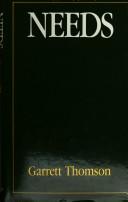| Listing 1 - 10 of 254 | << page >> |
Sort by
|
Book
ISBN: 9781009230179 1009230174 100923014X 9781009230162 1009230131 Year: 2024 Publisher: Cambridge, United Kingdom ; New York, NY, USA : Cambridge University Press,
Abstract | Keywords | Export | Availability | Bookmark
 Loading...
Loading...Choose an application
- Reference Manager
- EndNote
- RefWorks (Direct export to RefWorks)
Appeals to need abound in everyday discussion. People make claims about their own needs all the time, and they do so in a way that suggests these should have a certain moral force. Needs also play an important role in contemporary popular discourse about social justice, climate change, obligations to future generations, dealing fairly with refugees, treating animals humanely, and critiques of consumerist lifestyles - to name just a few of the many examples. The idea of need is present in an increasing number of debates and domains. There is interest in need from several disciplines, not just philosophy, which also include psychology, economics, political science, social work and sociology. This volume, then, offers a fine introduction to an increasingly important concept in day-to-day life. In a new Foreword, Gillian Brock discusses the continuing significance of several innovative chapters in the book, indicating how they presaged new directions in philosophical conversation.

ISBN: 3593328461 Year: 1981 Publisher: Frankfurt am Main : Campus,
Abstract | Keywords | Export | Availability | Bookmark
 Loading...
Loading...Choose an application
- Reference Manager
- EndNote
- RefWorks (Direct export to RefWorks)
Dissertation
Abstract | Keywords | Export | Availability | Bookmark
 Loading...
Loading...Choose an application
- Reference Manager
- EndNote
- RefWorks (Direct export to RefWorks)
Deze scriptie gaat over ambivalentie. Hierbij wordt eerst een literatuurstudie gegeven over ambivalentie waarbij we een verder uitdieping geven naar de persoonlijkheidsvariabele Need for Cognition. Deze variabele koppelen we aan ambivalentie waarbij we het volgende onderzoeken: Heeft de houding (laag, hoog niveau van Need for Cognition) een invloed op de gevolgen in verband met aversie die ontstaan bij de twee soorten ambivalentie: manifeste ambivalentie en geanticipeerde ambivalentie? Zorgt deze invloed ervoor dat we informatie gaan opnemen om de aanwezige ambivalentie te reduceren? Vanuit een online-vragenlijst onderzochten we deze onderzoeksvragen en kwamen we tot enkele vaststellingen.
Book
ISBN: 9781786636126 1786636123 Year: 2018 Publisher: Brooklyn, NY: London, Verso,
Abstract | Keywords | Export | Availability | Bookmark
 Loading...
Loading...Choose an application
- Reference Manager
- EndNote
- RefWorks (Direct export to RefWorks)
The basic discoveries underlying Marx's critique of political economy - labour power, surplus value, use value - are all in some way built upon the concept of need. From Marx's varying and passing interpretations of a theory of need, Agnes Heller unravels the main tendencies and demonstrates the importance which Marx attached to the "restructuring" of a system of needs going beyond the purely material. She also brings out those aspects, especially the idea of "radical needs" which point to revolutionary activity and to the project which Marx could only foresee but which for us today is of real urgency: the "society of associated producers". Thus Agnes Heller's study is not only the first full presentation of a fundamental aspect of Marx, but the basis for a discussion of the utmost contemporary relevance.

ISBN: 0710211147 9780710211149 Year: 1987 Publisher: London Routledge and Kegan Paul
Abstract | Keywords | Export | Availability | Bookmark
 Loading...
Loading...Choose an application
- Reference Manager
- EndNote
- RefWorks (Direct export to RefWorks)
Desire (Philosophy) --- Need (Philosophy) --- Philosophy --- Desire (Philosophy). --- Need (Philosophy).
Book
ISBN: 3499554607 Year: 1988 Publisher: Reinbek bei Hamburg Rowohlt
Abstract | Keywords | Export | Availability | Bookmark
 Loading...
Loading...Choose an application
- Reference Manager
- EndNote
- RefWorks (Direct export to RefWorks)
Need (Psychology) --- Psychogenic needs --- Motivation (Psychology) --- Need (Psychology).
Book
Year: 1976 Publisher: Paris: PUF,
Abstract | Keywords | Export | Availability | Bookmark
 Loading...
Loading...Choose an application
- Reference Manager
- EndNote
- RefWorks (Direct export to RefWorks)
Book
Year: 2016 Publisher: Bruxelles: UCL. Faculté de santé publique,
Abstract | Keywords | Export | Availability | Bookmark
 Loading...
Loading...Choose an application
- Reference Manager
- EndNote
- RefWorks (Direct export to RefWorks)
Book
Year: 2012 Publisher: Bruxelles: UCL. Faculté de médecine et de médecine dentaire,
Abstract | Keywords | Export | Availability | Bookmark
 Loading...
Loading...Choose an application
- Reference Manager
- EndNote
- RefWorks (Direct export to RefWorks)
Book
ISBN: 9782846783231 2846783233 Year: 2023 Publisher: Paris: MED-LINE,
Abstract | Keywords | Export | Availability | Bookmark
 Loading...
Loading...Choose an application
- Reference Manager
- EndNote
- RefWorks (Direct export to RefWorks)
Quand faut-il écrire un certificat ? Comment le rédiger ? Quels sont les risques et les pièges ? Ce guide fait le point sur ce qu’il faut savoir avant d’écrire. Dans votre pratique quotidienne, vous êtes souvent amené à rédiger un certificat ou tout autre écrit médical. Cet exercice peut s’avérer délicat… et parfois dangereux. Demandes abusives ou injustifiées de certains patients peuvent être à l’origine de plaintes auprès des instances ordinales ou judicaires. Ce guide rappelle ce qu’il faut savoir avant de produire un écrit médical. Il recense les différents certificats et leurs pièges éventuels et précise la responsabilité judiciaire du praticien. Enfin, il explique « ce qu’il ne faut pas faire » à travers l’analyse de 40 certificats ayant abouti à une procédure disciplinaire. Un véritable mode d’emploi, pour vous éviter bien des ennuis.
| Listing 1 - 10 of 254 | << page >> |
Sort by
|

 Search
Search Feedback
Feedback About UniCat
About UniCat  Help
Help News
News